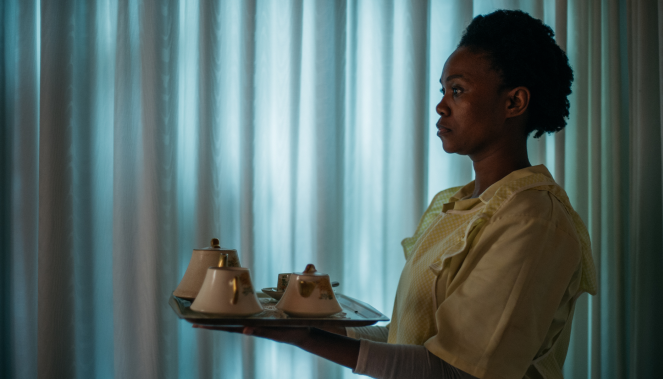The films on this list spoke to the major issues of the time, making their case for accelerated investment in the youth, prioritising institutional memory or rethinking harmful practices. These are some of the notable and finest titles we were able to catch in a theatre, stream at home or track at a film festival.
1. South Africa/Finland: African Moot
Lawyer-turned-filmmaker Shameela Seedat- whose Whispering Truth to Power documentary chronicled the final year in office of former South African public protector Thuli Madonsela- trails a group of law students across the continent as they gather in Botswana to compete in the largest mock court competition on the continent. Seedat is able to provide a snapshot of some of the biggest concerns of young people on the continent. It would seem like the future is in good hands as the young hopefuls in African Moot come off as smart, relentless and ultimately progressive.
2. Morocco, France: Casablanca Beats
For his latest outing, French-Moroccan filmmaker Nabil Ayouch has made a rough gem of a film that works as an exuberant musical and ode to hip hop at the same time. This inspiring story of a former rapper (Anas Basbousi) who arrives to teach hip hop to a posse of talented but troubled teenagers in an underprivileged community may be influenced by familiar tropes. But Casablanca Beats is performed and filmed with naturalism and a sincerity that makes it refreshing, nevertheless.
Rent on Amazon Prime Video and Apple TV
3. Nigeria, USA: Elder’s Corner
London-born Nigerian musician and filmmaker, Siji Awoyinka does an act of cultural service with this unforgettable excavation of cultural archives, history and memory. With Elder’s Corner, Awoyinka profiles and platforms a cross section of veteran Nigerian musicians who were among the pioneering musical figures of a newly independent country but whose contributions have since been forgotten. Elder’s Corner is made more imperative in that since Awoyinka filmed his subjects, a lot more of these icons have passed away, taking with them huge chunks of cultural history.
4. South Africa: Good Madam
Jenna Cato Bass’ Good Madam advocates for human nature as horror story while commenting directly- and otherwise- on the horrors and legacy of the apartheid regime in South Africa. Good Madam is a capable- if clunky- psychological chiller that interrogates the power dynamics between white madams and the Black maids who make their lives easier. A collaboration between Cato Bass and her cast, Good Madam sits somewhere at the intersection between haunted house fright and dutiful social commentary.
Watch on Shudder, Amazon Prime Video
5. Angola: Our Lady of the Chinese Shop
Ery Claver’s fascinating feature length debut is a modern-day allegory that has a lot to say about colonial traumas, imperialism, religion and national malaise. Set in Luanda, Our Lady of the Chinese Shop is slippery and mysterious in terms of plot mechanics yet clear enough about its politics. The ensemble cast is made up of characters who all have one thing in common- some encounter with a plastic statue of the Virgin Mary peddled by a two-bit Chinese hustler. Is this the miracle they have all prayed for or are they unwitting pawns of capitalism? There are no easy answers.
6. South Africa: Silverton Siege
Ignore the clumsy attempts at social commentary or the recurring thirst to draw parallels with the present and Silverton Siege might just be the strongest Original feature the guys at Netflix put out this year. Based on historical events that happened in Silverton, Pretoria in 1980, this Mandla Dube directed actioner stars Thabo Rametsi as the fictional leader of a trio of armed activists of the ANC’s uMkhonto we Sizwe faction who attempt to take a bank hostage when a stakeout goes horribly wrong.
Streaming on Netflix.
7. Tunisia, France, Luxembourg, USA: Streams
This slow burn exploration of the systemic unraveling of a Tunisian family is also an indictment of the hypocrisies of patriarchal societies that wear their conservatism like a badge. While struggling to make ends meet, a factory worker is sent to jail on charges of adultery and prostitution when she is sexually assaulted by a would-be benefactor. Director Mehdi Hmili is clear eyed and engaged as he extracts strong performances from his cast. Together they navigate the underbelly of contemporary urban living.
8. CAR, France, DRC: We, Students! (Nous étudiants)
We, Students! is the first film from the Central African Republic to premiere at the Berlinale. Young director Rafiki Fariala was an undergraduate at the University of Bangui when he started filming his friends as they struggled to graduate. A tad amateurish but with a clarity of focus, We, Students! is unsparing as it documents corrupt professors, sexual harassment and the terrible living conditions on campus. Regardless of the challenges, the students find ways of pushing through their circumstances. Fariala captures plenty of these complexities highlighting how people eventually become products of their environment.
9. Côte d’Ivoire, Senegal: Xalé
Xalé is the final entry in director Moussa Sene Absa’s striking women focused trilogy- see also Tableau Ferraille (1995) and L’Extraordinaire destin de Madame Brouette (2002). Unfolding against separate time frames, Xalé accounts for the fallout from a devastating incident that happens when a man attempts to marry his resistant cousin. Sometimes exasperating but always beguiling, Xalé embraces ancient and contemporary modes of storytelling. The result is a visually stunning and tale of familial love and loyalty.
10. South Africa: You’re My Favorite Place
The latest by auteur Jahmil X.T Qubeka is a personal yet vibrant adventure that takes the prolific Qubeka back to his hometown in East London in South Africa’s coast. You’re My Favorite Place is a young adult fantasia that follows a group of troubled youth on an adventurous road trip as they attempt to find themselves. Even though the film retains Qubeka’s chaotic energy, it is a surprisingly gentle love letter to young people that speaks to community and the universality of the teenage experience.
Streaming on Amazon Prime Video



